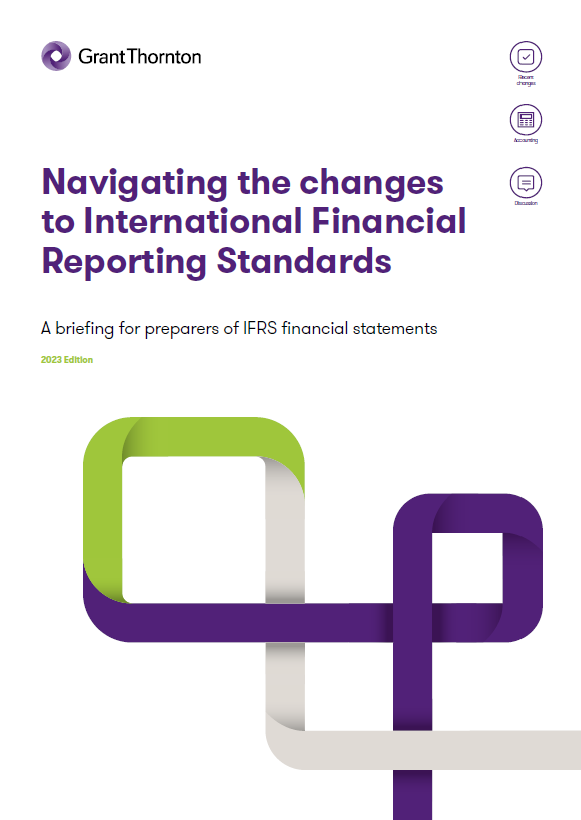-
Audit methodology
At Grant Thornton, we use a single audit methodology across our global network. This means that our clients gain the same proven, high-quality approach wherever they are.

-
Financial statements and consolidated financial statements
Preparation of monthly, quarterly or annual report and consolidated report on the basis of information presented by the client.
-
Financial Accounting
Effective bookkeeping and financial accounting are essential to the success of forward-thinking organisations. To get the optimum benefit from this part of your business, you'll need an experienced team behind you.
-
Tax compliance
Tax is likely to have an impact on almost every business decision you make. Whatever your business’s specific needs, we respond quickly and devise solutions tailored to you. We perform VAT, income tax, social tax and other tax accounting as well as present tax declarations to the tax authorities.
-
Chief financial officer service
Chief Financial Officer services include the periodic reporting, information systems standardization, internal document management and information flow optimization, budget preparation, cost accounting, cash flow and working capital management, financial analysis, investment return evaluation for managers.

-
International taxation
Grant Thornton operations in the Baltic States give us an access to the international expertise and allow advising the client on the minimisation of tax risks arising from conducting business in a foreign tax jurisdiction. We also consult foreign investors in finding an optimum group structure and form of enterprises in Lithuania and other Baltic States.
-
Transfer pricing
We advise the management bodies of local and multinational groups of companies in issues concerning transfer pricing of intra-group transactions and, if necessary, in the preparation of the relevant compliance documents. We also assist in preparing transfer pricing policies in order that future transactions are priced in accordance with the local as well as international regulations.
-
VAT refunds
We advise foreign clients in issues concerning the refund of value added tax paid in Lithuania, and Lithuanian clients – in the refund of value added tax paid in the EU member states. If necessary, we carry out these procedures on behalf of the client.
-
Profit tax, tax incentives
Our tax advisory department consults local and international clients in both everyday and specific taxation issues related to business activities.
-
Due diligence
Making the right investment decision can have a significant impact on shareholder value. To make an informed investment decision and create the best value from the transaction you will need the following an understanding of the target business identification and understanding of key business drivers an understanding of all the relevant issues clear analysis, conclusions and recommendations.
-
Assistance and representation during tax investigations, inspections, disputes
We provide services for registration in the Register of Taxpayers and the Register of VAT Payers. We represent clients' interests in tax disputes at the State Tax Inspectorate, Tax Disputes Commission, courts and other institutions.

-
Legal advisory for business start
We assist to quickly establish a company, branch or permanent establishment in Lithuania, open a bank account, VAT registration and obtain all necessary licenses for activity.
-
Legal advisory for business development
Our team has gained the greatest experience in advising international companies on the management of groups of companies. We advise and implement reorganizations or liquidations. Together with a team of tax and financial advisors, we perform a comprehensive due diligence (tax, legal & financial).
-
Labor law for CEOs and employees
We provide modern labor law solutions for the CEO, C-level managers and employees, which are tailored specifically to your business industry. We will take care of well-judged employment contracts and benefits package, protection of confidential information and non-compete agreements, handling of employee data or stock option rules, posting of employees, employment of EU and third-country nationals, organization of telework.
-
Fintech
With extensive experience in money laundering prevention and compliance and a strong team of financial experts, we advise clients on financial services, electronic money, licensing of payment institutions, capital formation, listing of mutual lending platform operators and other operational issues.
-
Migration and relocation
We assist you, your family members and employees of the organization to obtain national and European Union (Schengen) visas, residence permits, e-resident status, provide mediation letters and ensure a smooth relocation to Lithuania.
-
Due diligence
Making the right investment decision can have a significant impact on shareholder value. To make an informed investment decision and create the best value from the transaction you will need the following an understanding of the target business identification and understanding of key business drivers an understanding of all the relevant issues clear analysis, conclusions and recommendations.
-
Fintech advisory
The rapidly changing world and evolving technology are driving the development of new business models such as acting as a payment institution, a provider of virtual currency services and a financial institution. Grant Thornton Baltic provides support and advice to these companies.
-
Corporate finance management
Building a successful business requires a clear vision backed by a focused strategy. To achieve this vision, businesses must negotiate an increasingly complex environment.
-
Business Valuations
Choosing the right valuation method is the most important element in the process of estimating the fair value of a business as it must be adequate in terms of the purpose and object of the valuation. Grant Thornton uses only proven and generally accepted methods from among the wide range of income, asset and market approaches. Having conducted a preliminary analysis of the object and purpose of the valuation, we identify the method that will be the most appropriate considering the situation and characteristics of a given enterprise and the business sector in which it operates. Prior to commencing valuation, we also identify the documents necessary in the process.
-
Mergers and acquisitions
We provide advice to clients in all material aspects of the process of conducting transactions: finding a candidate for buyer, purchase or merger, initial analysis and valuation, negotiations, due diligence, structuring transaction price, preparing legal documentation and formal closing of the transaction. We also provide consultation for management buyouts.
-
Protection of Interests of Bondholders'
Grant Thornton provides bondholders' advocacy and protection services. We have resources, knowledge and the latest technology. Defending the interests of bondholders · Representing the interests of bondholders
-
External Financial Management Services
Providing an external financial management services makes it possible to manage a company’s finance on a day-to-day basis by a competent economist, without the need of offering full-time employment. By cooperating with experts on managing big-budget projects, we provide our clients with excellent support in comprehensive management of company’s finance.
-
Training
Financial Management Training and Seminars. Our experts have significant regional competence and close co-operation with our global colleagues. They happily share their expertise with our clients.

-
Internal Audit Services for Financial Sector Companies Licensed in Lithuania
Internal audit services adapted to Lithuanian financial sector companies ensure compliance with regulatory acts, risk management and operational excellence.
-
Internal Audit Services for EU/Foreign Aid Projects
Internal audit for EU/foreign aid fund projects helps to ensure compliance of activities and related costs with requirements.
-
Internal Audit for the Companies Certified by ISO
Internal auditing ensures ISO standard compliance, evaluates management system effectiveness, and gathers objective evidence of performance.

Trust and integrity form the basis of successful company management. One of the company's governing bodies - the board - plays a key role in shaping the company's strategic vision, ensuring accountability of the CEO, and transparency of operations. However, we often forget that the board's authority is limited by terms.
The Crucial Role of a Functioning Board
According to Lithuanian law, board meetings are the central venue for making important strategic decisions, overseeing the activities of the CEO, and giving approval for significant transactions. It is especially advantageous for businesses operating across multiple jurisdictions to institute a board, ensuring a cohesive governance structure throughout diverse legal landscapes. Additionally, an active board can help avoid conflicts and ensure consistent adherence to corporate principles and values in all countries.
Legislative Mandates on Board Tenure
Article 34, paragraph 3 of the Law on joint-stock companies of the Republic of Lithuania establishes the limit of the board's term - four years. However, according to the legal regulations established in Lithuania, for both the board as a whole and individual board members the number of tenure is unlimited - it is allowed to re-elect all or only certain members of the board for another term. During the tenure, the board is responsible for determining the conditions of the CEO's work, preparing annual reports, making decisions regarding assets valued at more than 1/20 of the authorized capital, evaluating the material provided by the CEO regarding organizational activities, financial condition, and operational results.
When a shareholder ensures timely renewal of the board's authority, it demonstrates not only compliance with legal requirements but also the shareholder's commitment to responsibly organize the smooth operation of the company. Additionally, it shows that the company cares about conducting its activities correctly and employs internal control measures. This increases trust among partners.
The Implications of Neglecting Board Renewals
The repercussions of not renewing board terms can be severe. A lapsed term may lead to the nullification of board decisions, as adjudicated by the judicial system. Notaries might also refuse to accept decisions or agreements if they were approved by an outdated board. Auditors may also make similar remarks. Additionally, failing to timely renew the board may invalidate the conditions of directors' civil liability insurance.
Call to Action for Proactive Governance
It is very important to align your company's practices with legal requirements and strategic business goals. In order to ensure that your company remains at the forefront of effective management and compliance, we invite you to consult with our legal experts. Our team is ready to help you understand the nuances of board governance and corporate management, ensuring that your operations remain strong and resilient in a dynamic business environment. We proactively monitor the duration of clients' board terms and draw attention in advance when it is time to make decisions regarding board term renewal. This way, we ensure that clients can focus on business decision-making, while we ensure the legal compliance of those decisions.
We invite you to get in touch and discuss how Grant Thornton Baltic legal advisory service department can help you achieve your goals and experience smooth and pleasant cooperation with. We are proud to have a 9.1/10 client satisfaction rating
Subscribe to audit, accounting, tax, legal and business consulting news. Be the first to receive Grant Thornton Baltic news, expert advice, professional business insights and event information.



